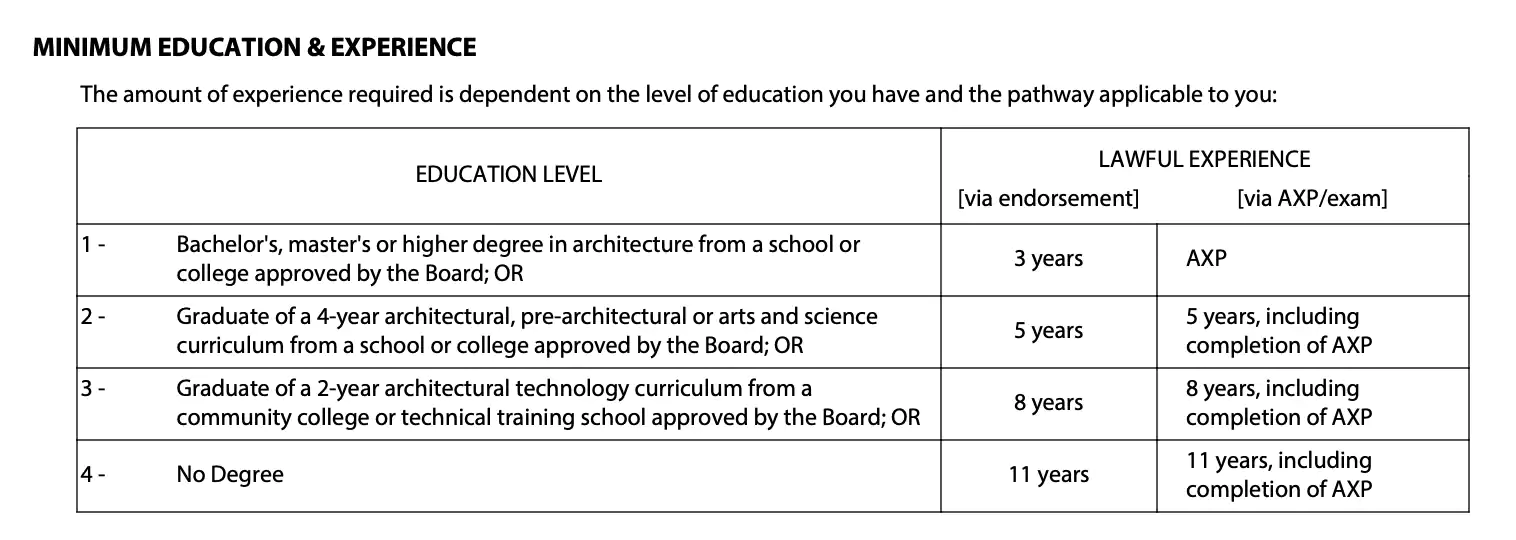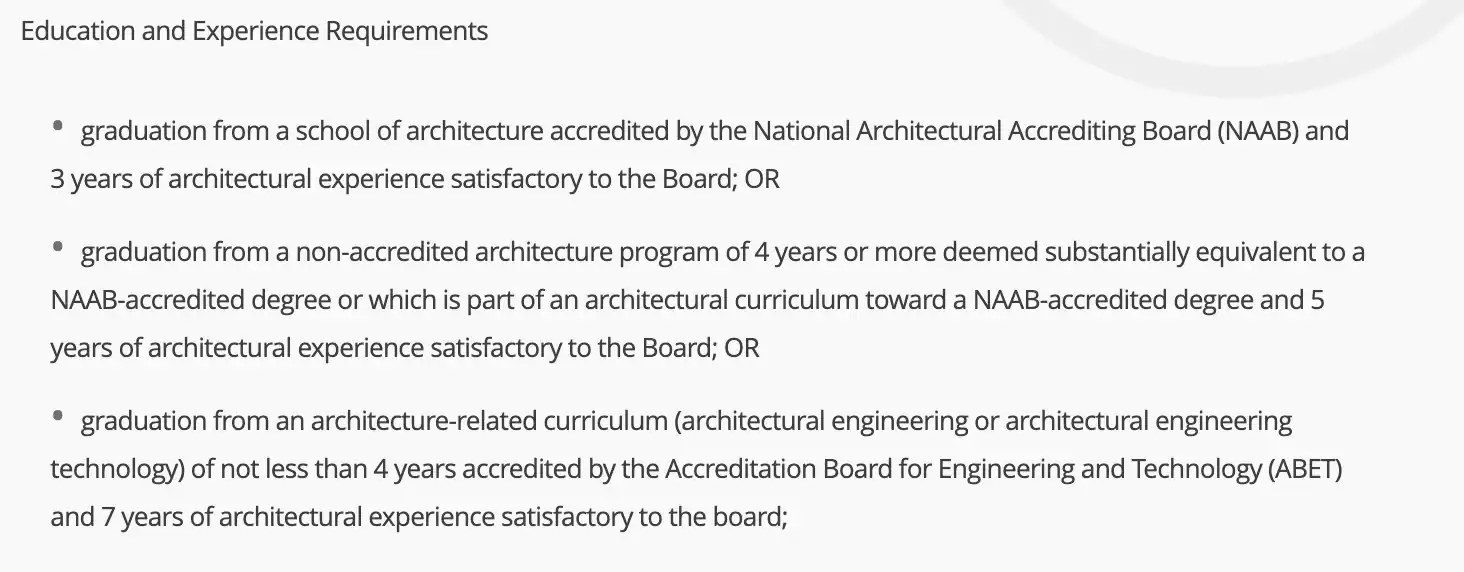How to get an architect license in the U.S.
Each state sets its own architect license requirements, but most follow a similar process. You’ll typically need a professional degree, supervised experience and to pass a national exam before applying for licensure through your state board.
Below are the main steps to becoming a licensed architect in the U.S.
1. Complete your education
Most state boards require a professional degree in architecture from a program accredited by the National Architectural Accrediting Board (NAAB).
Common paths include:
- A Bachelor of Architecture — a five-year professional program.
- A Master of Architecture — for those with an undergraduate degree in another field.
If your degree isn’t NAAB-accredited, you may need to complete additional coursework or have your education evaluated before applying for licensure.
A comparable degree or additional experience may be accepted to fulfill the education requirement, depending on the state. Many states will also accept an architecture degree from a Canadian university certified by the Canadian Architectural Certification Board (CACB). They may also accept Education Evaluation Services for Architects (EESA).
2. Complete the Architectural Experience Program (AXP)
Nearly all states require completion of the Architectural Experience Program (AXP), managed by the National Council of Architectural Registration Boards (NCARB).
AXP ensures you gain practical experience in six core areas of architecture, including:
- Practice Management
- Project Management
- Programming & Analysis
- Project Planning & Design
- Project Development & Documentation
- Construction & Evaluation
You’ll log hours under the supervision of a licensed architect and submit them for NCARB approval.
The AXP was formerly called the Intern Development Program (IDP). NCARB’s board of directors renamed it in 2016
3. Pass the Architect registration Examination (ARE)
The Architect Registration Examination (ARE) is a test that evaluates your ability to apply architectural concepts in real-world scenarios.
The ARE covers topics such as construction documents, building systems and project management. Some states allow you to take portions of the exam while completing your AXP hours — known as “early eligibility.”
Always confirm the specific requirements with your state architecture board before scheduling your exams.
4. Apply for your state architecture license
Once you’ve met education, experience, and exam requirements, you can apply for your license through your state’s architectural registration board.
Each state’s application process varies — you may need to submit education transcripts, verified experience records, test results, and an application fee. Some states also require a state-specific supplemental requirement (such as arctic engineering training in Alaska) or ethics review.
5. Consider NCARB certification for reciprocity
After you’re licensed, you can apply for NCARB certification to streamline working across state lines. Many state boards recognize NCARB certification as proof of qualifications when granting reciprocal licenses.
If you plan to expand your practice or collaborate on out-of-state projects, maintaining your NCARB Record can save time and simplify the process. It can even help you get licensed in Mexico, Australia, Canada and New Zealand.
Note: To keep your license active, most states require architects to earn continuing education hours (CEH) in HWS topics every year.
Business insurance requirements for architects
In the United States, architects are generally not required to obtain insurance as a prerequisite for licensure. However, some types of insurance are mandated outside of licensure, such as worker’s compensation. Other types, such as general liability or professional liability, may be required by clients or if you want to land a government contract.
Architects should consider several types of insurance to protect themselves and their business. The main types include:
The list is in alphabetical order. Find your state below to learn how to get your architecture license.
Alabama
License required: Yes
Licensing authority: Alabama Board of Architects
Requirements summary:
To qualify for initial registration, applicants must complete a professional education, supervised experience, and examination process consistent with NCARB standards.
- A professional degree in architecture from a NAAB-accredited program.
- Completion of the Architectural Experience Program (AXP) through NCARB.
- Passing all divisions of the Architect Registration Examination (ARE).
- Submission of required education, experience, and exam documentation to the Alabama Board.
- Reciprocal (NCARB) processing: $150; initial exam/eligibility handled via NCARB
Insurance requirements:
Alaska
License required: Yes
Licensing authority: Alaska State Board of Registration for Architects, Engineers, and Land Surveyors (AELS)
Requirements summary:
To qualify for initial registration, applicants must meet Alaska’s education, experience, and examination requirements as defined by the AELS Board and NCARB standards.
- A professional degree in architecture from a NAAB-accredited program. Degrees from CACB-certified universities or those verified through an EESA Evaluation are also accepted.
- Completion of the Architectural Experience Program (AXP).
- Successful completion of the Architect Registration Examination (ARE).
- Completion of a jurisprudence questionnaire and a board-approved Cold Region Design course.
- The application fee is $200, and the initial license fee is $100.
Insurance requirements:
Arizona
License required: Yes
Licensing authority: Arizona State Board of Technical Registration (AZBTR)
Requirements summary:
To qualify for initial registration, applicants must satisfy education and experience requirements that align with NCARB standards, though Arizona allows additional flexibility for experience-based pathways.
- Completion of the Architectural Experience Program (AXP) or IDP portfolio.
- Successful completion of the Architect Registration Examination (ARE).
- A NAAB-accredited degree is not required; applicants may substitute 60 months of experience to qualify for the ARE or 96 months of experience for initial registration with no higher education.
- Applicants with a four-year non-NAAB architecture degree must complete 48 additional months of experience.
- Application fee: $100 and initial registration fee: $225 ($325 total).
Insurance requirements:
Arkansas
License required: Yes
Licensing authority: Arkansas Board of Architects, Landscape Architects & Interior Designers (ASBALAID)
Requirements summary:
To qualify for initial registration, applicants must meet education, experience, and examination standards consistent with national NCARB guidelines.
- A professional degree from an NAAB-accredited program for initial registration. While a CACB-accredited degree is not accepted, an EESA Evaluation is.
- Completion of the AXP/IDP with an AXP portfolio.
- Completion of the ARE.
- Completion of a board-supplied affidavit stating they understand the Arkansas Architectural Act and Rules and Regulations.
- You must pay an application fee.
Insurance requirements:
California
License required: Yes
Licensing authority: California Architects Board (CAB)
Requirements summary:
To qualify for initial registration, applicants must satisfy education, experience, and examination requirements consistent with national and state standards.
- Satisfy education and experience requirements. Degrees certified by the Canadian Architectural Certification Board (CACB) or evaluated via an Educational Evaluation Services for Architects (EESA) evaluation are accepted.
- Completion of the Architectural Experience Program (AXP) or its equivalent with an AXP portfolio.
- Completion of the Architect Registration Examination (ARE).
- Take the California Supplemental Examination (CSE).
- You must pay the application fee of $300.
Note: Effective October 1, 2025, candidates may obtain testing authorization for the ARE or CSE before fully documenting their training and educational experience.
Insurance requirements:
Colorado
License required: Yes
Licensing authority: Colorado State Board of Licensure for Architects, Professional Engineers and Professional Land Surveyors
Requirements summary:
To qualify for initial registration, applicants must meet education, experience, and examination standards that align with NCARB guidelines—but Colorado provides substantial experience-based pathways in lieu of certain education requirements.
- Completion of the Architectural Experience Program (AXP) / IDP; an AXP portfolio may also be required.
- Successful completion of the Architect Registration Examination (ARE).
- The board also accepts architecture degrees certified by the Canadian Architectural Certification Board (CACB) or via an Educational Evaluation Services for Architects (EESA) evaluation.
- You must pay an application fee of $100.
Colorado recognizes substantially equivalent education or experience; the Board may accept up to ten years of practical experience in lieu of certain education requirements.
Insurance requirements:
Connecticut
License required: Yes
Licensing authority: Connecticut Architectural Licensing Board (under the Department of Consumer Protection)
Requirements summary:
To qualify for initial registration, applicants must meet education, experience, and examination criteria aligned with national architectural licensure standards.
- A professional degree from a NAAB-accredited program is required; degrees certified by the CACB or evaluated through an EESA Evaluation are also accepted.
- Completion of the Architectural Experience Program (AXP) or equivalent IDP portfolio.
- Successful completion of the Architect Registration Examination (ARE).
- You must submit an application and pay an application fee of $72, with an additional one-time $190 license processing fee.
Insurance requirements:








